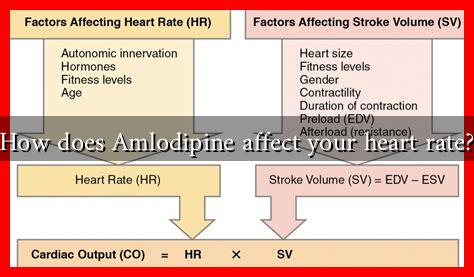-
Table of Contents
How Does Amlodipine Affect Your Heart Rate?
Amlodipine is a widely prescribed medication belonging to the class of drugs known as calcium channel blockers. Primarily used to treat high blood pressure (hypertension) and angina (chest pain), amlodipine has significant effects on the cardiovascular system, particularly on heart rate. Understanding how amlodipine influences heart rate is crucial for patients and healthcare providers alike.
What is Amlodipine?
Amlodipine works by relaxing the blood vessels, allowing blood to flow more easily. This action helps to lower blood pressure and reduce the workload on the heart. It is often prescribed for patients with hypertension, coronary artery disease, and certain types of heart failure.
Mechanism of Action
The primary mechanism through which amlodipine affects heart rate is by blocking calcium channels in the smooth muscle cells of blood vessels. This leads to:
- Vasodilation: The widening of blood vessels reduces resistance and lowers blood pressure.
- Decreased myocardial oxygen demand: By reducing the workload on the heart, amlodipine helps alleviate angina symptoms.
- Heart rate modulation: Amlodipine can influence heart rate indirectly through its effects on blood pressure and vascular resistance.
Effects on Heart Rate
While amlodipine is primarily known for its blood pressure-lowering effects, its impact on heart rate can vary among individuals. Here are some key points regarding how amlodipine affects heart rate:
- Bradycardia: In some cases, amlodipine may lead to a decrease in heart rate, a condition known as bradycardia. This is more likely to occur in patients who are also taking other medications that lower heart rate.
- Tachycardia: Conversely, some patients may experience an increase in heart rate (tachycardia) as a compensatory mechanism due to the drop in blood pressure.
- Stability: Amlodipine is generally well-tolerated and does not typically cause significant fluctuations in heart rate for most patients.
Clinical Studies and Evidence
Research has shown that amlodipine effectively lowers blood pressure without causing significant changes in heart rate. A study published in the Journal of Hypertension found that patients treated with amlodipine experienced a notable reduction in systolic and diastolic blood pressure, with minimal impact on heart rate. This makes amlodipine a preferred choice for patients who may be sensitive to heart rate changes.
Another study highlighted in the Circulation Journal indicated that amlodipine could be beneficial for patients with both hypertension and coronary artery disease, as it effectively manages blood pressure while maintaining stable heart rates.
Considerations and Side Effects
While amlodipine is generally safe, it is essential to consider potential side effects and interactions with other medications:
- Drug Interactions: Amlodipine can interact with other medications that affect heart rate, such as beta-blockers, leading to bradycardia.
- Side Effects: Common side effects include swelling, dizziness, and flushing. Patients should report any unusual symptoms to their healthcare provider.
- Monitoring: Regular monitoring of blood pressure and heart rate is crucial, especially when starting or adjusting the dosage of amlodipine.
Conclusion
Amlodipine is an effective medication for managing hypertension and angina, with a relatively stable effect on heart rate. While it can lead to bradycardia or tachycardia in some patients, most individuals experience minimal changes in heart rate. Understanding the effects of amlodipine on heart rate is vital for optimizing treatment and ensuring patient safety. Regular monitoring and communication with healthcare providers can help manage any potential side effects and interactions, allowing patients to benefit from this essential medication.

